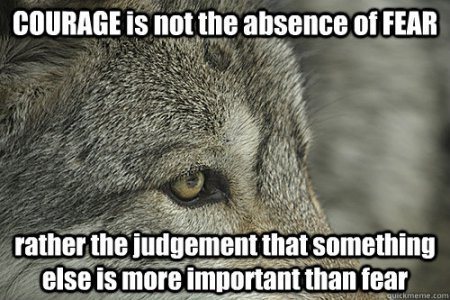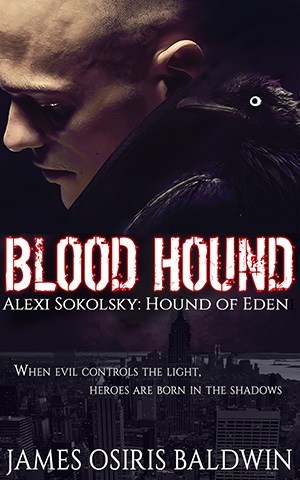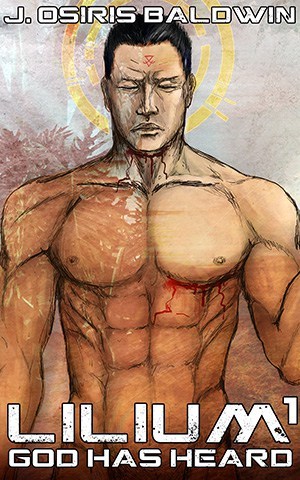James Osiris Baldwin's Blog, page 4
March 1, 2016
Start and end your chapters with suspense
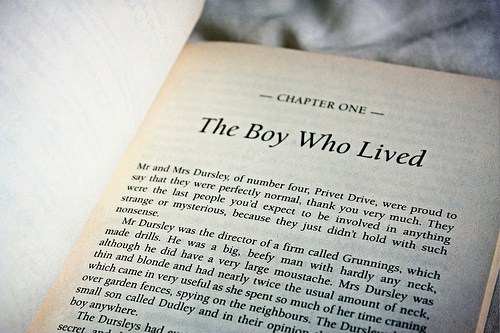 Chapters – sometimes as small as a single scene, or as long as a third of a book – are an integral part of the novel format and an important tool in the hands of a writer. A chapter acts like a brief ‘fade’ to black, like the fade-out cuts you see on TV shows or movies. They trim long boring actions and ‘refocus the camera’ on the action that is really important to the story. The places where you divide your 50,000-200,000 word wall of text are crucial to driving suspense and tension and creating a great story.
Chapters – sometimes as small as a single scene, or as long as a third of a book – are an integral part of the novel format and an important tool in the hands of a writer. A chapter acts like a brief ‘fade’ to black, like the fade-out cuts you see on TV shows or movies. They trim long boring actions and ‘refocus the camera’ on the action that is really important to the story. The places where you divide your 50,000-200,000 word wall of text are crucial to driving suspense and tension and creating a great story.
The suspense is killing me!
Suspense has a very easy definition, and I advise you to burn the following words into your brain and/or skin if you like to write genre fiction: Suspense is created when the reader is left uncertain over the outcome of a character’s action.
Suspense is created when an author wields uncertainty like a psychological weapon against the reader. To best leverage uncertainty in your story, you have to have excellent control of time and tempo.
One of the masters of temporal sorcery is, sadly, Dan Brown. My personal opinion is that Dan Brown writes about as well as Donald Trump speaks (“I have words! I have the best words!”), but I will give the credit where credit is due. The DaVinci Code is a masterpiece of suspense, and that shows in its sales figures. But how did he do it?
Besides a generally exciting concept, he did it by controlling chapter length, and using chapter division and point-of-view switching to bring his story to boiling point and keep it there.
If you have a copy of that book, go back through it and find the chapter headings. You will notice that there are upwards of a hundred chapters in The DaVinci Code. A hundred and four chapters, if you count the epilogue and prologue. ONE HUNDRED AND FOUR.
Why so many? Well, because Dan Brown decided to split his chapters on a per scene basis. In other words, rather than squish multiple scenes into a chapter, he basically just wrote a single scene and called it a chapter. Some of these ‘chapters’ are only a page long! He also often splits his point of view between scenes, head-hopping between his two heroes and the antagonists. In every instance, the author ends on a suspenseful note. The character in that scene is doing something and the actions they take do not have a certain outcome by the time that pagebreak occurs. The reader is basically compelled to turn to the next chapter.
Momentum is the cornerstone of a good thriller, and because people tend to think of novels in ‘chapters’, they will often read a story with the intent of finishing ‘one more chapter’ before they go to bed. But if the chapters are short and each one ends with suspense, they never put it down. It’s kind of like putting chicken salt on your mashed potatoes. The potatoes might be great or they might be bland, but the MSG – the chemical that excites your brain – keeps you eating past the point of fullness.
So that’s one technique you can use to divide your book – write shorter chapters. Write one page chapters, if you have to. This is very good for thriller and crime writers who need to cut between actions and overtly employ suspense to create the drama of the story.
The smoldering story
Quickstepping via chapters is one way to control time, but it’s not suitable for all stories. Romance and Fantasy novels tend to benefit from a more measured pace, otherwise, the reader starts to feel jerked around. Worldbuilding and character building tend to be fairly integral parts of the experience, and a one-page chapter just won’t fly.
But that doesn’t mean you don’t need suspense. As you write or revise, have a look at your provisional chapters. What is the last action taken by the characters? Is it resolved? One thing you sometimes see is a chapter ending on a pleasant note of finality. “And then he rolled over and went to sleep.” Well, so did your reader: Literally, because a lot of people read in bed.
Start and end a chapter with a note of uncertainty, and see how much faster the book moves. With my own urban fantasy novels, I find that my chapters run anywhere between 2000-5000 words, and include several scenes.
Your mastery of time must be a bit more subtle than renowned author Dan Brown when you include multiple scenes per chapter. One common problem I see in fantasy is ‘temporal padding’. These are things like walking from place to place, cooking, horse travel, car travel (without plot significance or dialogue), bathing, eating and chatter between characters that is not relevant to the story or that resolves within the course of the conversation. You know when you’re drafting and struggle to know what to do do with your characters? That’s a bit of a giveaway that you’re in spitting distance of one of these padded scenes.
When you reach a point where your merry band must move locations, start a new chapter. Crossing from one end of the room to the other is fine; the forest journey is pointless unless something integral to the story is going to happen there. If the characters plan at dawn and execute their plan at sundown, start a new chapter and skip. The unresolved plan is suspenseful.
Romance can utilize this with interpersonal interaction. End the chapter with someone leaving, committing to an action (but not doing it yet), arriving, realizing something wonderful or awful…but not quite revealing what that wonderful or awful thing is.
Other times to end a chapter and start a new one include:
Any point of view or character perspective shift.
The culmination of a crisis.
Temporal transition.
Fast-track experiences.
The space between preparation and execution.
The introduction of someone important the story.
Significant change of scene.
The start of a key series of events.
What are your other favorite ways to create suspense?
Sign up to the Mailing List for more great writing and editing tips, special offers, and sneak previews! http://eepurl.com/YbEP1
Related posts
Writing with courage and fear
Writing with courage and fear
The Fear
Search keyword
Blood Hound: Read a Sample on Amazon!
Tags
Alexi Sokolsky blog blood hound book review craft of writing crime fiction editing fantasy fear fedora fiction fix your damn book! flying FYDB! gangster fiction Hound of Eden illuminati in Soviet Russia M/M magic military MUSCLES R NOT CUTE news NYARRRGH opinion politics popes propaganda rage rant russian mafia s science fiction short story software for writers stop killing people you fucking twats travel Undertale Undyne unicorn rides you! wizards writer chat writertips writing
February 6, 2016
Why you should use stereotypes in your writing
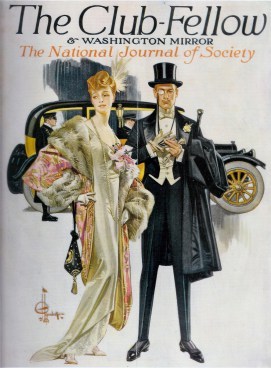 Before we knew how to talk about it, the gender gap was just a given.
Before we knew how to talk about it, the gender gap was just a given.I used to work in security. One of the guys I worked with was this huge Russian bouncer guy: nearly seven feet of muscle-gut and bald head, tattoos on his hands, gold tooth. You know the guy I’m talking about, don’t you?
Without needing to say much at all, you probably have a mental image of this guy. He’s a stereotype. So are Harry Potter (abused child genius, complete with baggy hand-me-downs, messy hair, and broken glasses), Batman (rich handsome white guy), Katniss Everdeen, Anna Karenina, and King Solomon. Practically every character in modern (and pre-modern) storytelling conforms to the stereotype of what that ‘kind’ of person should be. One could even argue that character creation is in fact the art of creating stereotype: you are quite literally creating a person, with a personality, formed for the express purpose of acting a part within your story.
A stereotype is a thought that can be adopted about specific types of individuals or certain ways of doing things, whether or not that perception is accurate or founded in reality… and this is where stereotyping becomes an interesting tool in the hands of a writer.
Playing the part
Stereotypes are psychological shorthand. Humans weren’t really built to deal with communities spanning millions or billions of people. We have a hard limit on the number of faces we can recognize, which is one of the reasons that people from different countries often perceive foreigners as ‘looking all the same’. Because we have limitations on our processing power, the human brain looks for patterns. We do this with physical things, such as clouds, and also with social patterns. Conspiracy theories and stereotypes are born from the same need to make sense of the randomness we see around us.
This leads to an interesting phenomenon. Because humans are instinctive pattern seekers, and because most of us enjoy living in communities, we begin to internalize certain stereotypes based on the glimpses of pattern around us, internalize them, and practice them. This is particularly true in the arenas of life where presentation and appearance are important. There’s reasons we have mousy librarians, edgy tattoo artists, big tough firefighters, geeky scientists and nerdy I.T specialists. Stereotypes have evolved in the micro-cultures of libraries, tattoo parlors, fire houses, laboratories and cubicle farms, because the jobs favor certain types of personalities and physical builds. Once the pattern is noticed, it becomes self-reinforcing. The CEO of a big I.T corporation is interested in hiring people who look the part because they associate the stereotypical presentation with the qualities they require from an employee. Over time, the company’s software developers will naturally conform to the stereotypes established by that corporation. There are exceptions… but there are fewer exceptions in society than we’d like to admit.
What this means is that we tend to assume and embody certain stereotypes ourselves, and we do this to get to where we want to go. By doing this, it can seem like we are almost destined for a certain fate, and those who buck the trend (by appearing somehow stereotypical while aspiring to something else that others do not ‘type’ them for) invite conflict and resistance from the majority. This is particularly noticeable in, say, women who work in blue collar occupations. They have to fight twice as hard for twice as long to be taken seriously. Yet, in doing so, they often find themselves conforming to a ‘female cop’ or ‘female electrician’ stereotype to survive. Those who cannot do so often buckle under the twin pressures of the establishment and the alternative. It takes incredible personal energy to truly walk alone.
What this also means is that stereotypical presentation is often quite superficial. A person may walk the walk (or stroll the stroll, in the case of supermodels), but underneath that facade is still an entire person. And that unseen inner self… they may not conform to a stereotype at all.
What kinds of stereotypes do your perspective characters believe exist in the different social groups around them? What kind of stereotypes does your character use to get their way in society… and are they aware that they are doing this? Is it comfortable, or uncomfortable?
In either case, reversing their self-concept – either by making them conform, or making them realize that they can’t – is an excellent avenue for conflict.
Buying in
Self-enforcement of stereotypes can mix in with the person we really are.
Have you ever wondered why people, by and large, seem so shocked when priests are caught out abusing children, or why every conservative ‘family values’ politician caught in a truck stop bathroom with a rentboy is a ‘scandal’? That is the full power of stereotypes at work. They have assumed the role of kindly priest or straight-laced senator… because they are consciously or unconsciously aware of the power they have to manipulate others in that role while they do what they actually want to do. These people often go so far as to disassociate from their real inner selves, believing that their stereotypical role is ‘them’, and that the emotionally complex or neurotic self is ‘not them’. These sick people feel very strongly that their dark sexual or homicidal or sadistic impulses are from ‘somewhere else’ that is not ‘them’.
And now we know why The Devil was invented. Imagine the potential that this offers you as a writer.
If you struggle to create compelling, believable antagonists and villains, this is how you do it. Have a look at who your antagonist is, what they do. Why do they do that thing? And what is their self-stereotyping hiding from themselves?
Power games
Stereotypes are, by and large, a great thing for those in power, and dehumanizing and limiting for those subject to that power. This is why we have stereotypes of Philanthropic Wealthy White Men and Drug Addicted Homeless Bums, which is enforced externally (from the media and society) and internally (by the standards of the micro-culture). Reinforcement can be positive or negative, but it all leads to the same thing. Those in power tend to receive more favourable, empowering stereotypes than those who do not have power. Even when unfavourable, those in power tend to be able to get away with things that other groups cannot. The media invented the word ‘affluenza’ based on one such stereotype – the Misunderstood Rich Teenager.
Stereotype content refers to the attributes that people think characterize a group. These attributes – positive or negative – tend to be what we first think when we hear someone is from a particular group, and this is one way that a group will establish and maintain power over other groups. Many people don’t see the harm in certain racial stereotypes – the Smart Asian Kid stereotype, for example (Cho Chang, anyone?). The reason this is actually a pretty awful racist trope is that the stereotype does nothing to empower the people it claims to represent while also rendering invisible those who do not conform to the stereotype (what about the Chinese artists, Indian adventurers, Thai philanthropists, the American-Korean winemakers..?). In addition, the ‘Smart Asian Kid’ trope furthers the myth of other less positive stereotypes that disempower Asian communities as whole – mostly ones about immigration, a lack of masculinity (in men) and victimization (in women). And what the hell does ‘Asian’ mean, anyway?
Remember the outrage over images of Syrian refugees charging their cell phones? The stereotype of the refugee does not match the reality (that most Syrians able to flee their country were middle or upper class, in terms of income), and so many people cannot believe they are ‘refugees’. By obliterating complexity and nuance, stereotypes are used to disempower and silence entire swathes of the population. Those in power also have a tendency to ‘lock in’ stereotypes and refuse to change their assumptions about other people based on any range of superficial qualities. The ridiculous arguments used to enforce anti-transgender ‘bathroom laws’ are a case in point. Stereotypes are used to explain social events… or explain them away.
The saddest thing about this is that stereotyping often becomes a self-fulfilling prophecy. Socially marginalized people are angry people, and economically disenfranchised people still have to find ways to pay the rent and put food on the table. They are often compelled to resort to the path of least resistance.
What does this have to do with you as a writer, you may ask? Two things:
Whose story are you telling? Really? And why are you telling it?
How do your characters wield power within the story? Are they aware of their power, or the lack of it? Those who have less power are usually sensitive to their lack of agency; those who have power are often quite unaware, considering themselves ‘normal’ and everyone else ‘other’.
Making characters memorable
As I pointed out early on, many memorable and beloved characters are actually stereotypes – or, more accurately, they are typical for their genre, which is itself stereotypical. We know what kinds of characters to expect in spy novels, mysteries, romances and fantasy*.
 However, just because one feature of a character can be categorized as being typical does not make the entire character a stereotype, and this is where you, the writer, have the ability to manipulate your reader’s expectations. And as well you should.
However, just because one feature of a character can be categorized as being typical does not make the entire character a stereotype, and this is where you, the writer, have the ability to manipulate your reader’s expectations. And as well you should.
If you dig under and around and through the stereotypes that are relevant to you and your work, you will never have a boring bit-character ever again.
By being aware of your own favorite stereotypes and by doing your research to dig underneath the stereotype you hold of any particular group, you can teach yourself and your readers something new about people through what you write – or you can reinforce existing perceptions.
Remember my huge Russian bouncer friend from the first paragraph? He was a shift manager, and also the best ‘talker’ on the weekend nightshift team. I watched him talk down big men, small men, women of all sizes and levels of intoxication in the same calm, well-mannered, witty way. He was a very softly spoken, very intelligent man who enjoyed classical Russian literature and told a lot of interesting stories… including the ones about the tattoos on his hands.
* Interestingly, science fiction is one of the few genres where it is more difficult to predict the social stereotype of a character in any given novel or film. This has a lot to do with the progressive avant-garde nature of the genre… and is one of many reasons why the ‘Sad Puppies’ are indeed sad, small little people for trying to rig the Hugos.
If you enjoyed this post, sign up to my mailing list to learn about new posts and new releases! http://eepurl.com/YbEP1
February 5, 2016
‘Sin’ lies at the heart of ‘business’
You know the funny thing about the whole Martin Shkreli trial? There are literally tens of thousands of people like this running companies, and millions more in the business world. There are CEOs who comfortably order the forced displacement and massacre of native people in South America. They poison towns, infiltrate governments, and science to promote their for-profit agenda. They put melamine in milk powder, killing six children and hospitalizing 54,000 babies, and then go to sleep in their four-poster beds without a care in the world. In 2012, Jiang Weisuo, a 44-year-old general manager of a dairy products plant in Shaanxi province, was rumored to have been murdered in Xi’an city. It was Weisuo who had first alerted authorities to the scandal.
The affable, neat businessmen who society lauds as ‘job creators’ and people to aspire to be like are malignant narcissists, as this man is… and the only reasons Martin Shkreli was singled out are because he looks and sounds like a villain. He’s an ugly, weaselly loudmouth, and that’s why he’s being punished while others like him carry on about their daily business.
The effective ones disgust and scare me more. No one will touch them, because they don’t look like the weasels they are.
I wrote about this in the story I sent in as part of my Clarion West application, Mark of the Beast:
The worst criminals, by far, are narcissists.
All of us choose what best suits our interests, our desires, our impulses. If our desires are in line with society, all is well. In my case, my desire to be the man my grandmother believed in exceeds my desire to fuck, kill and eat pale boys with pretty hands. The darkest of these whimsies started up about a year after killing Randy, fading in with a late puberty. I entertain the fantasy of cannibalism most days now, watching beautiful men with perfect hips jutting from the shadows of doorways in Queens, but act on it? Nah. It’s nothing but a cute dream, and it’s nothing I can’t play out with a well-paid twink, a cold bath, and a rare roast veal dinner.
Malignant narcissists can’t think that way. The only person that’s real is themselves. As far as they’re concerned, they’re the only tree in the forest, and they’ll do whatever it takes — whatever it takes — to make sure it stays that way. They’ll lie, cheat, kill, and maim for themselves. These are the real monsters. Some get off on hunting, like Bundy, but others run lobbies and corps and countries. They preen for the golf course and sail their yachts and look and sound so very reasonable. They’re leaders at church. They rape their daughters in the dark.
And sometimes, they proxy-murder their pregnant girlfriends and deal coke at Honeys, a titty bar on Park Avenue in the Bronx.
February 1, 2016
God Has Heard: LILIUM #1
God Has Heard
Nephilim are the super-weapons of the future, hapless pawns in an unending trench war between two great super-nations: the theocratic, totalitarian state of the UNAC, and the techno-socialist Pacific Alliance.
The Samuel-226 PatriotRangers are one of the most successful units in the Holy Legion of the UNAC. They have never lost a man, until one of their brothers, Twofer, disappears during a training exercise. The Host, self-proclaimed reincarnations of Christ, tell them that Twofer has been Saved and taken to Yetzirah, the promised land of the Nephilim.
This, like many things the Host tells its slaves, is a lie.
God Has Heard is military science-fiction told up close and personal: a dark war story of martyrdom and ultimate triumph, brotherhood and dignity in the face of total oppression. With echoes of 1984 and Saving Private Ryan, it is a short, intense, thought-provoking read.
#goodreads-widget {
font-family: georgia, serif;
padding: 18px 0;
width:875px;
}
#goodreads-widget h1 {
font-weight:normal;
font-size: 16px;
border-bottom: 1px solid #BBB596;
margin-bottom: 0;
}
#goodreads-widget a {
text-decoration: none;
color:#660;
}
iframe{
background-color: #ffffff;
}
#goodreads-widget a:hover { text-decoration: underline; }
#goodreads-widget a:active {
color:#660;
}
#gr_footer {
width: 100%;
border-top: 1px solid #BBB596;
text-align: right;
}
#goodreads-widget .gr_branding{
color: #382110;
font-size: 11px;
text-decoration: none;
font-family: "Helvetica Neue", Helvetica, Arial, sans-serif;
}
Goodreads reviews for God Has Heard
Thieves’ World
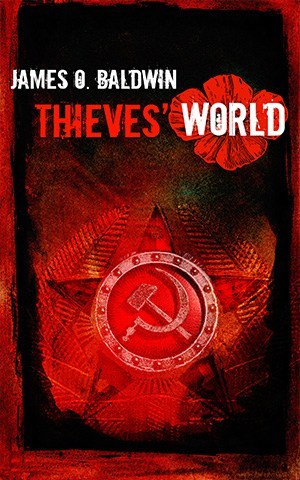 Thieves’ World
Thieves’ WorldAfghanistan, 1989. After five years of honorable but involuntary service on the front lines, ex-convict Nicolai Chiernenko found power and respect in the Soviet Army. Not that it counts for anything. The USSR has lost the war in Afghanistan and is in retreat. Tempers are rising and discipline is breaking down on base. Nic can only count the days until he regains his freedom.
The day before Nic leaves to start a new life in America, the body of a teenage soldier is found dumped in a ditch outside base. The boy’s sergeant calls in a favor and begs Nic to help him find the killer. Nic has the connections to sniff them out, but the only clue he has is the method of execution: a deadly technique straight out of the Russian special forces handbook.
Blood Hound
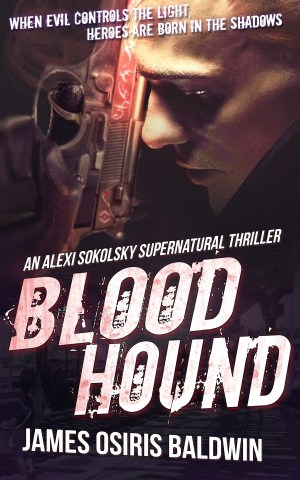 Blood Hound
Blood Hound“One of the first things every new mage learns about magic is that—despite your newly discovered powers over the universe—you are forever a struggling speck of krill in a very large, very cold, very dangerous ocean.”
My name is Alexi Sokolsky: blood mage, occult scholar, and hired killer. Three things that should convey me some immunity in the dog-eat-dog world of the Russian mafia. Fat chance. I think too much, drink too little, and if there’s one thing the underworld teaches you, it’s that there’s always a shark bigger and hungrier than you are.
Life gets tough after a man turns up dead in our territory, his mutilated body scrawled with demonic sigils. It gets tougher again when a key ally of my Organizatsiya is kidnapped by a secretive death cult… and I’m sent like an errand boy to hunt them down and bring him back.
Then I get captured, nearly killed, and am immersed in a sea of cosmic horror the likes of which I’ve never known. The stakes are nothing less than the life of GOD Itself… and it’s calling to me for help.
My name is Alexi Sokolsky: blood mage, occult scholar, hired killer, and hapless pawn in the great game between Everything and the NO-thing trying to destroy it.

Goodreads reviews for Blood Hound
November 17, 2015
Let me tell you a story about a Muslim refugee
First: the missing passport.
I was traveling out of Australia for the very first time back in 2010, visiting Seattle in the USA to stay with some friends. I’d spent ten wonderful days in the USA and had gotten the train from Seattle to LA in preparation for flying home. We had just crossed the border into California when I realized, with more than a little horror, that my passport was missing. Gone.I tore apart my luggage, my bed, my clothes. Nothing.
In a horrendous panic, I called back to my friends in Seattle. My passport had fallen out of its wallet and was still in my friend’s bedroom, where I’d been staying. They took it to the post office to send it by courier overnight (bless them), but learned at the office that you’re not allowed to mail passports to private addresses. Passports have to be sent to the Australian Embassy and picked up from the office.
The train arrived in LA at night, and I stayed in a cheap hotel on Sepulveda Blvd near the airport, panicking for the entire night. My flight was in the morning: If I got out first-thing, I had a two hour window to pick up my passport before I had to get back to the airport.
At eight in the morning, I managed to get my hands on a map. None of the hotel staff knew how to get to the Embassy by public transport, but they were sympathetic. I had no mobile phone, no Google Maps, and no money for a taxi: I was young, inexperienced, carrying far more luggage than I needed, and alone in a city five times the size of Melbourne, the only city I knew. I had no experience with the kind of density that this city had and no idea how its public transport worked.
Resolute, I marched to the bus stop and tried to figure out my route. I was turning the map around, trying to make sense of LA’s incredibly convoluted bus system, when a tall black guy with a scraggly beard in baggy jeans, red scarf and red basketball jersey swaggers up to me and snatches the map out of my hands.
He turned it around, and handed it back. “Hey man, you look at it this way ’round.”
25-year old me was scared and extremely defensive at being approached so brazenly by a strange man, and worse, being touched. It freaked me the fuck out. “Uhh… thanks.”
“No worries. You’re looking pretty upset. Where you going?”
I ended up explaining what the matter was to this man, Muhammad. When I told him that I was racing the clock to get my passport and get to my plane, he patted me on the back and told me not to worry about a thing: he’d take me to the embassy. And he did. He paid for my fare (I didn’t have the right coins for the machine), waved away the notes I tried to give him, and literally walked me from the airport to the other side of the city and back again, giving up an hour and a half of his time. And while he was doing that, we talked, and he told me his story.
Muhammad wasn’t born in the USA: he was a Sudanese refugee who had been able to get a green card. He and his entire extended family left the country and ended up split across the world. Some of them lived in the Midwest, he lived in LA, some of his cousins lived in Germany, his fiance in Scandinavia. He worked as a cleaner at night and studied computer science full time in the day (“I haven’t slept for 36 hours, for real!”). He wanted to create educational programs for schools, and make enough money to bring his fiance to America.
We ate jelly beans on the bus on the way to the embassy. I asked him about the red colors: he said that he could only afford to live in a part of LA where there were a lot of gangs. He wasn’t actually in a gang despite his getup, but he told me that when he wore his preferred clothes, people hassled him. He dressed like his neighbors did, and people stopped hassling him for being visibly Muslim. It was easier to pass as a gangbanger.
At the embassy, Muhammad insisted on coming up with me because he wanted to meet the Australian Ambassador. He shook her hand with great excitement. When I asked him if I could give him something for his time, he refused twice (which told me he meant it), but he finally accepted the rest of the jellybeans. He wished me a good flight. I wished him all the best with his lady love and his course, and thanked him profusely for his help. I will never forget his expression of genuine pleasure at having been able to help me, a flagrantly queer, pierced transman, an admitted Atheist, find an obscure office in Los Angeles after his underpaid night shift on a hot and unpleasant day.
We lost touch after that, but I have never forgotten this man’s generosity, his words, or his humility.
We did talk about religion during that trip. He was an extremely devout, observant Muslim, and was excited for Ramadan. He didn’t care that I wasn’t when we started talking about beliefs. I told him that I thought all creation is important and meaningful in its own right, without necessitating a god, and Muhammad said that he believed the same thing, only there was a god who had created it all to begin with.
Thanks to this stranger, I got my passport back on time, got on my plane, and flew home safe.
Since then, I have experienced this same generosity and humility from Muslim people – Arab and Kurd, Iranian and Turk, Indonesian and Chinese – many, many times. It’s often in small ways: the pleasure expressed when I become a regular at a small business, the extra generous helpings at a kebab stand in Berlin when I complimented the vendor’s meat, the extra piece of lokum at my local Turkish restaurant when I admitted being a writer working on my book, the quiet worldliness of an Iranian man I met at a writer’s group in Cork, who wanted to talk to me about Indigenous Australian culture – these are the Muslims I know in my day to day life. I am made physically sick when I think of these people being massacred, being spat on, being bombed and hurt and turned away from safe lands because a fractional percentage of their countrymen are violent, marauding thugs.
For fuck’s sake, people. Put it in perspective. The combined forces of Daesh/ISIS, Boko Haram and Al Qaeda make up 0.003% of the Muslim population of the entire world, maybe. Most of them are the Daesh rabble occupying the ruins of the Central Middle East right now. A good proportion of them are non-combatants.
The vast majority of terrorist attacks by these extremist groups are exacted on their countrymen: usually the moderate and helpless. While Daesh and the others would undoubtedly love to wade through a river of American and Australian blood, we white folks are hiding behind a dense human shield of mostly Shia Muslims, and people like the Yazidi, who have their own syncretic religion (the worship of Malek Taus, the Peacock Angel, and an Islamic-Gnostic concept of divinity). I fear these motherfuckers more than most – any member of Daesh would probably rape me with a sword and throw me off a roof for being transgender and queer – but fuck if I’m going to judge the people on the front lines of their savagery.
The gay men they threw off roofs and stoned to death? They were Muslim. The girls they enslave? The people of Beirut and Iraq? What faith are they?
Besides that, less than 2% of terrorist attacks in the EU have been motivated by Islam. Do you know what most of them were motivated by? Nationalism, the same bullshit that has made a sudden and enormous resurge after the Paris attacks. The vast majority of terrorist attacks in E.U. countries have for years been perpetrated by separatist nationalist organizations.
As for Australia, the worst mass shooting in our history was perpetrated by a white Australian: the Port Arthur massacre. The worst act of terror in recent times in Europe is arguably the 2011 rampage by Anders Behring Brevik, a white supremacist and nationalist.
I remember when a gang of Lebanese guys were going around raping girls in Sydney, back in the early 00’s. There was massive anti-Lebanese and anti-Muslim furor back then, with the Cronulla riots and everything. Recently, a gang of four white guys brutally raped a 14-year old girl in a park in Geelong. Two of them were British tourists. Where’s the riots telling Whitey to go back home?
There are 1.6 BILLION Muslims in the world. If they really wanted to destroy Western civilization – if they were as hostile and scary as some people seem to think – do you really think we’d be able to stop them? 1.6 billion, on every continent on Earth. There’s 1.3 million people in the US military. If there was some united purpose among Muslims everywhere, don’t you think we’d know by now?
Daesh are going to sneak operatives into the refugees fleeing them and their fascist government. They are. But for every fuckwit, there are thousands of perfectly normal people fleeing the kind of loss we cannot even imagine. People separated from their fiances by entire continents. People who have lost their children. A museum curator tortured to death for not revealing the location of priceless antiquities. Muslim security guards and bystanders in Paris and Beirut who stopped suicide bombers, sometimes with their own bodies and lives, to prevent the deaths of hundreds.
And yet, every one of my online channels is suddenly full of hate for Muslims (who are often equated with ‘Arabs’ by many). Some of the people who were posting ‘Black Lives Matter!’ on Facebook every day earlier this year are suddenly cheering on Alabama and other states for refusing to accept Syrian refugees. Black lives apparently only matter some of the time now.
With every border refusal, the West creeps closer to the same Fascist ideology that bought about the Syrian civil war in the first place. Because make no mistake: the Syrians aren’t fleeing a religious war. They’re fleeing an oppressive right-wing dictator who responded to the protests of his people by massacring them. Their religion is incidental: Asaad has routed Sunni, Shia, Sufi, Yazidi, Zoroastrian and Christian alike.
Fascism is oozing its way back into the popular way of thinking. But I remember the Muslim people who have been kind and gentle and generous, and I feel tired. My stomach is full of glass every time I read the news. The hatred and ignorance makes me sick.
November 1, 2015
Master List of Software for Writers and Editors
With NaNoWriMo on the horizon, many bright-eyed, bushy-tailed young things are planning to write their books – as well as wondering how they’re going to write them.
So, what is the best software to write a novel on? What writing software do published authors use? I’ve seen these questions asked by many of my peers over the years. In my own opinion, there is no One Magic Program To Rule Them All. Individual preference is the biggest factor when it comes to drafting, refining, formatting and publishing a book. George R.R Martin famously uses the ancient DOS program WordStar. Other writers, like Stephen King, often draft parts of their novels by hand.
You probably don’t have a DOS machine from the 80’s, but fortunately, there are heaps of software programs for writers. The following is a list of my favorite writing software and software programs that come recommended by my writer mates from around the web.
Drafting
My opinion is that good old fashioned pen and paper is hard to beat for notes, sketching, and ideas. However, there’s definitely contenders for those who don’t like handwriting.
Focuswriter (all platforms, including Linux)
Focuswriter is my personal favorite digital drafting tool. I do my first drafts by hand, and ‘type in’ with this program. It is an easy-to-use, reliable and attractive program which offers a full-screen/distraction-free writing environment. You can easily customize font, background, formatting and text area width, as well as set word count or duration goals. It’s also free, or you can donate to the program author.
Download FocusWriter here: http://gottcode.org/focuswriter/
WriteRoom (Mac) and Byword (Mac)
These are Mac-specific ‘distraction-free’ writing tools. WriteRoom is very similar to FocusWriter. It is fairly basic full-screen/distraction-free writing software that allows for quicker and more focused drafting. Byword is a bit more fancy and supports Markdown. It features Mac keyboard shortcuts, word counters with live updates, and syncing across devices. I’m a PC boy, so I’ve never used them. I’ve heard they’re good.
Download WriteRoom here: http://www.hogbaysoftware.com/products/writeroom
Download Byword here: http://bywordapp.com/
Write or Die
Most programs rely on your innate sense of self-discipline to be effective. Write or Die bribes, punishes or rewards you to write. It offers a ‘punishment’ mode that will play horrible sounds and images, a ‘stimulus’ mode to woo you into writing for longer, and a ‘kamikaze’ mode that will actually start unwriting your words if you take a break or stop. Pretty intense, but a lot of NaNos swear by it.
Write or Die is a bit like a steampunk writer’s tomato timer, except that instead of getting a neutral ring every 20 minutes, you get kittens and purring as your reward, or alarms and spiders as punishment. As writing programs go, this one looks and feels a bit like a slot machine. As I said, some people love it. If you find discipline to be a problem and also enjoy a bit of competition, it might be right up your alley. You can try it for free, but the full version costs $20 USD.
Download Write or Die here: http://writeordie.com/
WikidPad
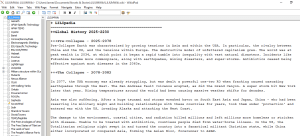 WikidPad is a free desktop wiki program that lets you build indexes of ‘pages’ that interlink. It is my absolute favorite program for building series bibles and reference documents for worldbuilding. It’s free, small, fast, and very easy to set up, though there is a bit of a learning curve to figure out how to properly link pages and make the most out of WikidPad’s features. I adore it, because it wholesale gratifies my inner nerd.
WikidPad is a free desktop wiki program that lets you build indexes of ‘pages’ that interlink. It is my absolute favorite program for building series bibles and reference documents for worldbuilding. It’s free, small, fast, and very easy to set up, though there is a bit of a learning curve to figure out how to properly link pages and make the most out of WikidPad’s features. I adore it, because it wholesale gratifies my inner nerd.
Download WikidPad here: http://wikidpad.sourceforge.net/
Compiling, revising, and structuring
Scrivener
Scrivener is THE writer’s software, in many ways. It is honestly suitable for any stage of the writing process, but I find that it excels at sorting out messy first drafts. This is the program to get your book into shape.
Scrivener has so many features that it is hard to list them all. A corkboard with index cards, individual chapters, dual windows (so you can look at an old draft and revise a new draft in another panel), chapter management, editing tools, story generation tools, formatting and draft compiling, backup and draft management… this baby has everything. Because of this, it also has quite a learning curve – but if you want to run with the pros, Scrivener is probably your best bet.
Scrivener only costs $40 USD, and there is often a discount on this for NaNoWriMo winners every year. There’s a 30-day free trial period and lots of testimonials from published authors who wrote their books (in whole or in part) in Scrivener.
If you’re on the fence about Scrivener, my advice is to go for it. It’s better and cheaper than Office, and you can use it for more than just novel writing. I use it for essays, research compilation, freelance work… the lot. If you want a free alternative, LibreOffice or OpenOffice are your best bets.
Buy Scrivener here: Scrivener for Windows (Amazon Affiliate link) or Mac (also an affiliate link).
LibreOffice Writer
LibreOffice (and OpenOffice) are both very similar programs. They work somewhat like older Windows XP-style versions of Microsoft Office, before Microsoft got carried away with ribbon navigation and fancy-schmancy XML. It’s free, comprehensive, and doesn’t have many bells and whistles. Its files are also highly compatible with Microsoft Office programs. Given that Microsoft Office is standard in the publishing industry, it’s good to have some assurance that your manuscript will look the same on the Penguin Acquisitions Editor’s screen as it does on yours.
Download LibreOffice here: https://www.libreoffice.org/download/libreoffice-fresh/
Save the Cat! Story Structure Software
The late Blake Snyder’s ‘Save the Cat!’ series is to screenwriting what Stephen King’s ‘On Writing’ is for novelists: an absolute treasure trove of information, hacks and advice on how to write a screenplay or movie script. Much of the advice in Save the Cat! is also applicable to authors writing books, especially if you’re just starting out and wondering how to write a novel.
The company that Blake started now publishes writing software based on Save the Cat!, which retails for $99.95 on their website. I have never tried it, but if you’re a fan of the books and want to pump out commercial novels or screenplays, it could be everything you ever wanted.
Buy Save the Cat! here: http://store.savethecat.com/products/save-the-cat-story-structure-software-3-0-download
Snowflake Pro
Another reasonably pricey bit of software, Snowflake Pro is based on Randy Ingermanson’s ‘Snowflake Method’ of novel planning and writing. It is probably most suited to die-hard plotters – not so much for pantsing.
Buy Snowflake Pro here: http://www.advancedfictionwriting.com/product/snowflake-pro-software/
Editing
There’s not really any good comprehensive editing software out there, I’m afraid. The grammar checkers in Word and LibreOffice are about the best you’re going to find for copy editing.
I tried Grammarly and was not impressed. It is barely better than Microsoft’s grammar tool in Word. One program that does deserve a mention is the Hemmingway App (http://www.hemingwayapp.com/). Hemingway is an automated grammar checker which looks for a few specific problems: run-on sentences, passive voice, complex or obscure words, and adverbs.
However, Hemingway has some serious limitations. It cannot recognize rhetorical devices, for example. It will mark up good sentences that sound beautiful to the ear as being ‘too complex’, and it will falsely identify passive voice. It will point out every adverb you use, but it can’t recognize ‘weak’ words like ‘might’, ‘could’ and ‘should’. For example, the sentences below are from some terrible roleplaying I saw, but they pass Hemingway’s ‘tests’:
 Hemingway has no ability to distinguish good writing from poor writing.
Hemingway has no ability to distinguish good writing from poor writing.If you recognize the limitations of this app and use it carefully, Hemingway can be useful at the copy editing stage of writing. It’s possibly even more useful for non-fiction, where short sentences and clarity are both desirable.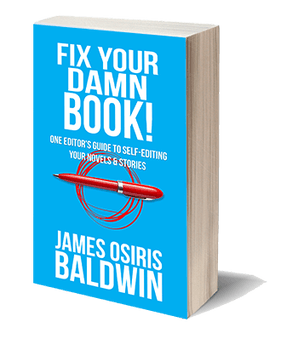
I hope this helps you navigate the world of writing software, and if you know of any other good programs, email me and I can add them to the list. If you found this post useful, please share it around.
Also, if you happen to be writing a novel, stay tuned for Fix Your Damn Book! A guide on self-editing for authors which I hope to release for Christmas 2015. Fix Your Damn Book! is a quick and dirty guide to all parts of the editing process, from getting in the right psychological frame of mind to assessing your work, through to the management of beta-readers and how to get the best out of your own author voice. To keep up to date with production and sign up as a beta-reader, join the mailing list by clicking here.
November 30, 2014
Pripyat: A Vision of the Future?
Postcards from Pripyat, Chernobyl from Danny Cooke on Vimeo.
Wow. Absolutely haunting view of Pripyat and Chernobyl… and reminiscent of the future world I imagine in LILIUM, though the world 300-ish years from now, as depicted in GOD HAS HEARD and OUR LADY OF SORROWS is considerably wetter, greener, and warmer. There is nearly no metal left remaining in the ruined battlefields of the novels, only jungles, sinkholes, massive sunken cities, and broken concrete, plastic and foam.
The song is ‘Promise Land’ by Hannah Miller, in case you’re wondering.
Chernobyl and Fukashima really ought to be a warning to us all… but as it turns out, humans don’t learn from the past very well.
October 17, 2014
Review God Has Heard!
I hope you enjoyed God Has Heard. Thanks for coming on the ride!
… It’s not over yet, though. There’s one final installment of the serial. Check out the Post-Script for God Has Heard here.
Want to Support the Author? Here’s how!
– Buy or download a copy of GHH ($2.99 ebook, $6.99 paperback) for your Kindle or Amazon desktop app, or bookshelf here: http://www.amazon.com/dp/B00J3XYUYM
Consider becoming my Patron on Patreon! Patrons get a whole lot of super-secret special stuff, while helping me stay fed for as little as $2 a month, and you can stop support at any time. Learn more about Patreon here: 

– Leave a review in the comments below!
– Share God has Heard with your friends on Facebook using the buttons to the left or at the bottom of this post!
Of course, this book is only the beginning of the series, and there’s a lot more to fill in with the upcoming book, Our Lady of Sorrows. Stay tuned and Join the LILIUM Mailing list to be the first to hear more about LILIUM 2: Our Lady of Sorrows, including sneak previews, cover reveal, and beta reader signup.







